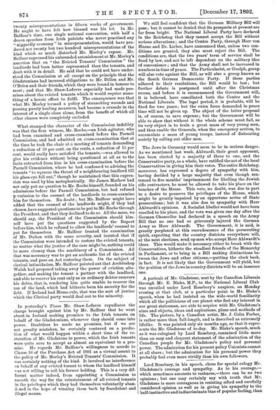What stamped the character of the Commission indelibly was that
the first witness, Mr. Roche,—an Irish agitator, who had been examined and cross-examined before the Parnell Commission, and had admitted on cross-examination that at the time he took the chair at a meeting of tenants demanding a reduction of 50 per cent. on the rents, a reduction of 15 per cent. would really have satisfied the tenants,—was allowed to give his evidence without being questioned at all as to the facts extracted from him in his cross-examination before the Parnell Commission, where he had confessed to advising the tenants " to squeeze the throat of a neighbouring landlord till his glass-eye fell out," though he maintained that this expres- sion was used by him metaphorically. Sir James Mathew had not only put no question to Mr. Roche himself, founded on his admissions before the Parnell Commission, but had refused p rmission to the counsel of the landlords to cross-examine him for themselves. No doubt ; but Mr. Balfour might have added that the counsel of the landlords might, if they had chosen, have suggested questions to be put to Mr. Roche through the President, and that they declined to do so. All the more, we should say, the President of the Commission should him- self have put the questions suggested by the Report before him, which he refused to allow the landlords' counsel to put for themselves. Mr. Balfour treated the examination of Mr. Dalton with the same severity, and insisted that if the Commission were intended to restore the evicted tenants, no matter what the justice of the case might be, nothing could be more clumsy than the machinery of a Commission. All that was necessary was to get an authentic list of the evicted tenants, and pass an Act restoring them. On the subject of clerical intimidation, Mr. Balfour pointed out that Archbishop Walsh had proposed taking away the power of eviction alto- gether, and making the tenant a partner with the landlord, and able to recover his rent only as an ordinary debtor recovers his debts, that is, rendering him quite unable to recover the use of the land, which had hitherto been his security for the debt. If Ireland had Home-rule, that was the sort of justice which the Clerical party would deal out to the minority.






































 Previous page
Previous page